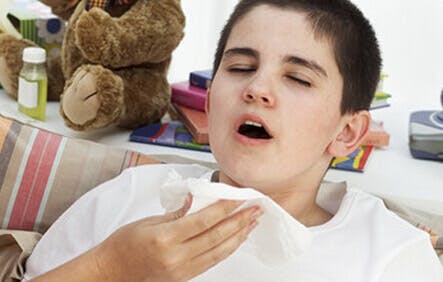Cough: A-to-Z Guide from Diagnosis to Treatment to Prevention

Introduction to cough:
Your home calms at night, the children are tucked into bed – but then loud coughing replaces the silence. It’s impressive that a body so small can cough so loud.
What is it?
Coughing is an important part of the body’s defense system. It forcefully propels unwanted invaders up and out of the body.
It signals some irritation in your child’s air passages. This irritation may be in the throat, the lungs, or in the passageways connecting them.
Coughing often accompanies infections of the upper or lower respiratory tract, such as colds, flu, sinus infections, croup, bronchitis, bronchiolitis, measles, or pneumonia. Sometimes it will linger once the infection has cleared.
Hair cells, called cilia, normally move mucus along the respiratory tract to keep the area clean and moist. If these cilia are damaged during an infection, the body may use coughing to move this mucus along – even after the invading germs are gone. Thus, the cough sensors tend to be hypersensitive following an infection.
Whenever a child has a recurrent or persistent cough, it is important to consider a diagnosis of asthma. Many children with asthma have cough as their primary symptom. The diagnosis is often delayed in these children, and they fail to get the preventive medicines they need.
Other important causes include allergies, inhaled foreign bodies, GE reflux, pertussis, chronic sinusitis, tuberculosis, inhaled irritants (smoke or fumes), pressure on the respiratory tract from the outside (perhaps from lymph nodes or blood vessels), or habit.
Occasionally it can be caused by swimmer’s ear, which can trigger cough sensors in the ear canal.
Who gets it?
All children will cough occasionally as a part of their bodies’ way to fight infections and irritation. Nevertheless, it is a symptom that deserves attention. While sneezing in a newborn is usually normal, a cough usually indicates that something needs to be addressed. In older children as well, it is a sign of irritation and it is important to discover the cause.
What are the symptoms?
The sound of the cough often depends on the location of the irritation. If an infection is in the voice box (croup), it may sound like a barking seal. If it is deeper in the bronchi (bronchitis), the cough will sound deeper as well.
A chronic nighttime cough might signal asthma, nasal allergies, or a chronic sinus infection. A habit cough disappears with sleep. A cough that is at its worst when your child first awakens might signal bronchitis.
The cystic fibrosis cough is also usually worse in the morning. It tends to be productive, and may come in spasms.
A productive cough might also signal bronchitis or pneumonia.
Coughing spasms may be a sign of pertussis or of an inhaled foreign body. Spasms of coughing accompanied by vomiting or a whooping noise may also indicate pertussis.
Is a it contagious?
People are a little more likely to cough when they hear someone else coughing, but it is is not truly contagious. The infection that causes it is often contagious, however.
How long does it last?
The length depends on the underlying cause. Any cough that lasts for weeks or months should be considered persistent or chronic, and evaluated accordingly.
How is a it diagnosed?
The underlying cause may often be diagnosed based on the history and physical exam. Sometimes additional tests, such as a chest x-ray, TB skin test, blood test, pulmonary function test, or even bronchoscopy, may be needed.
Diagnosing it is very important if it makes it difficult for your child to breathe, if you suspect your child may have inhaled some food or other object, if there are intense spasms of coughing, if your child otherwise seems ill (as with a high fever), or if it is not improved within two weeks.
Any cough in a newborn or young infant should be evaluated.
How is a it treated?
Identifying and treating the underlying cause is they key. If it is from reflux, the reflux should be treated. If it is from tuberculosis, TB meds are needed.
Asthma coughs should be treated with asthma medicines, not with suppressants.
Although over-the-counter cough suppressants are readily available, they are not always helpful – even if the cause is not asthma — and even if they seem to work. It is often helping your child clear mucous and debris from the airways and lungs. Sleep may help your child more, though, so discuss treating the cough at night with your child’s pediatrician. Elevating the head at night may help, and sometimes a cough syrup at night is a real boon. However, over-the-counter cough suppressants should not be used in children less than 6 years of age without discussing their use with your pediatrician. Studies have not proven that over-the-counter cough suppressants are effective in this age group, and the potential for serious side effects are greater in young children.
Extra fluids to drink, and a humidifier for the room will help many kinds of cough.
There is some evidence that two teaspoons of dark honey (such as buckwheat honey) may be effective for nighttime cough, and it is safe to use for children over 12 months of age (Arch Pediatr Adolesc Med, 2007 Dec; 161(12):1140-46).
How can it be prevented?
Childhood immunizations can prevent significant cough illnesses, including measles, pertussis, Haemophilus influenzae (Hib), and pneumococcal pneumonias. The flu can also be prevented by vaccine.
Breastfeeding is protective against many of the infectious and allergic causes of cough. Other efforts at prevention are aimed at preventing the individual underlying causes.


